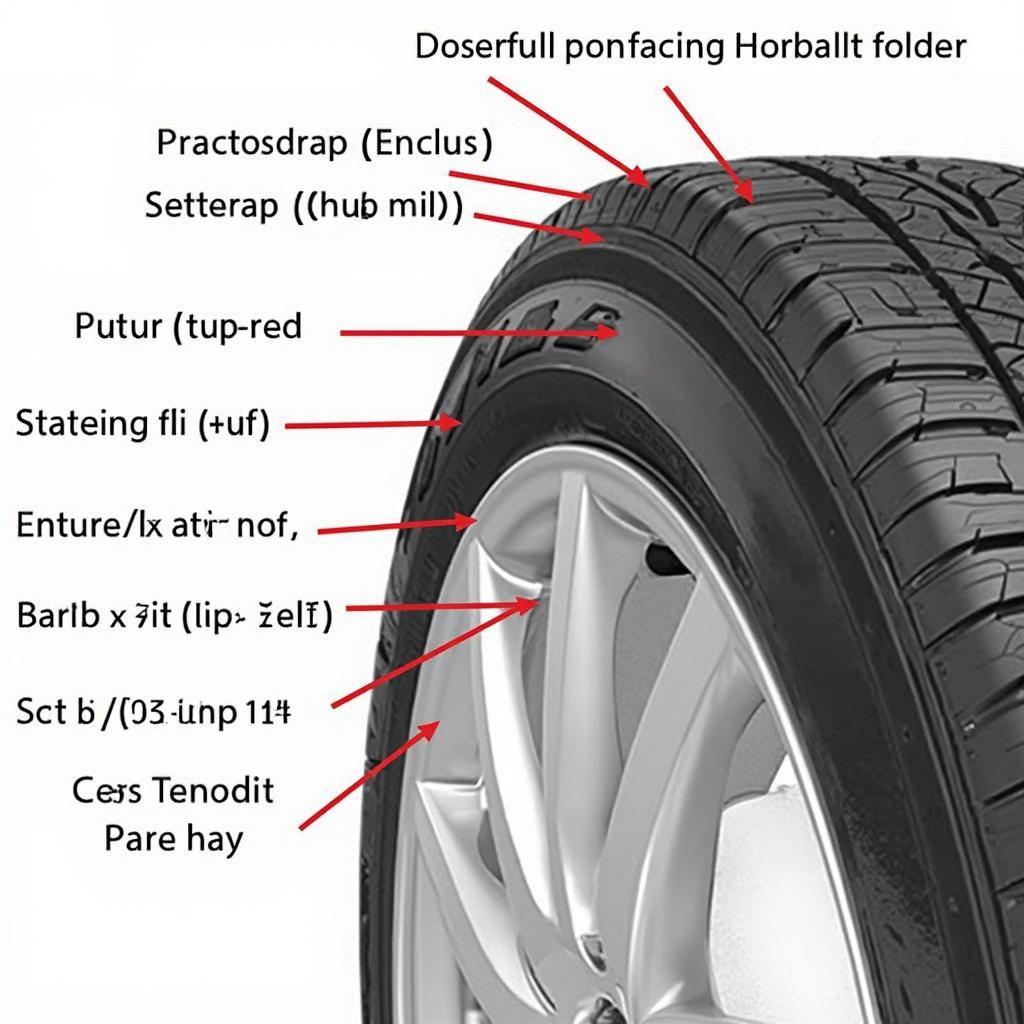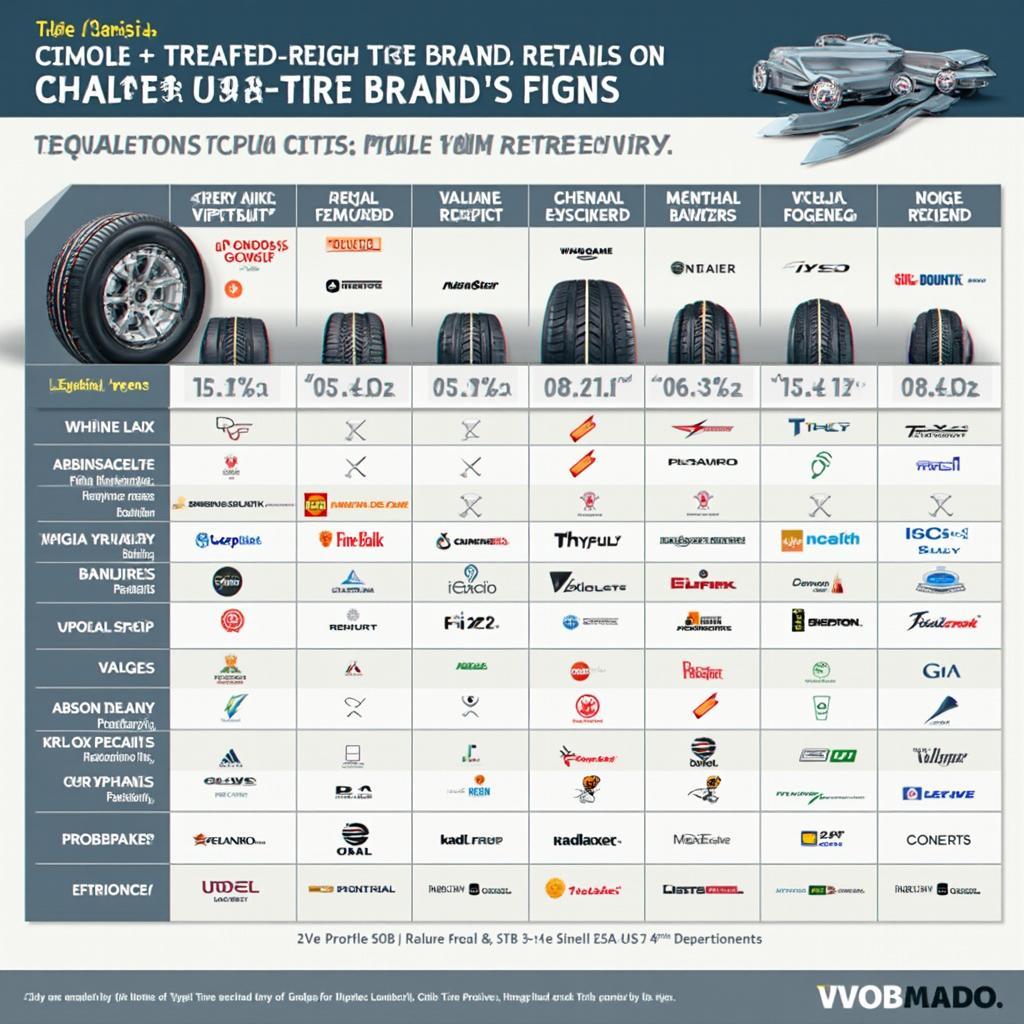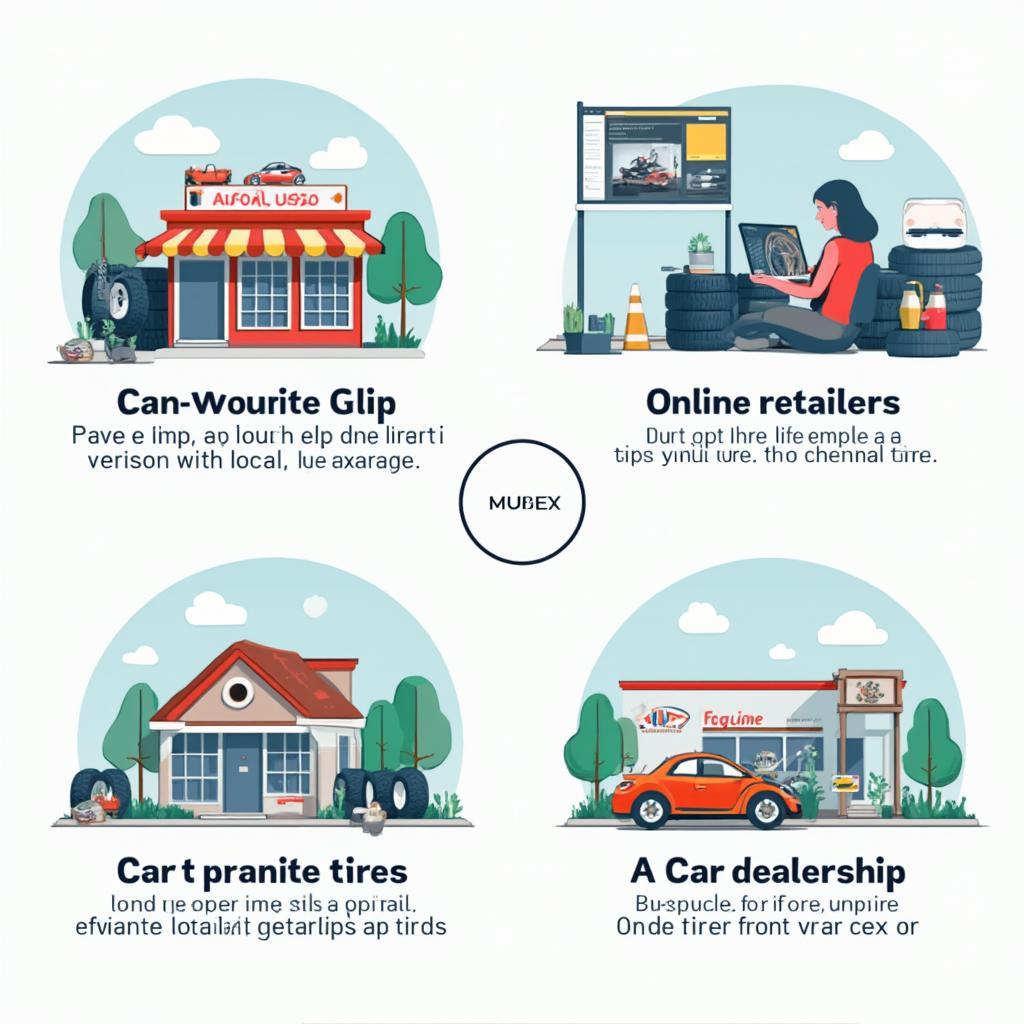Your cart is currently empty!

Tips to Buy Car Tires: Your Ultimate Guide
Finding the right car tires can be a daunting task. With so many brands, types, and sizes available, understanding the key factors involved in choosing the best tires for your vehicle and driving needs is crucial. This guide will provide you with essential Tips To Buy Car Tires, ensuring you make an informed decision and invest in a set that offers optimal performance, safety, and longevity.
Understanding Your Tire Needs
Before diving into the specifics of buying car tires, it’s essential to assess your driving habits and the typical conditions you encounter. Do you primarily drive on paved roads or frequently venture off-road? What’s the climate like in your region? Understanding these factors will help you determine the type of tire best suited to your needs. Consider factors like mileage requirements, desired performance characteristics (handling, braking, ride comfort), and fuel efficiency goals. Knowing what you need will make navigating the tire market much easier.
Are you looking for tires that prioritize fuel efficiency? Perhaps you need tires designed for high-performance driving? Or maybe you’re seeking all-terrain tires capable of handling various road conditions. Identifying your specific needs is the first step towards a successful tire purchase. If you often find yourself looking for ways to improve your car’s fuel efficiency, check out our tips on making your car more fuel efficient.
Decoding Tire Sizes and Specifications
Tire sizes and specifications might seem like a jumble of letters and numbers, but understanding them is crucial. These codes contain vital information about the tire’s dimensions, load capacity, speed rating, and construction. You’ll find this information printed on the sidewall of your existing tires. For instance, a code like “P215/65R15 95H” tells you the tire’s width, aspect ratio, rim diameter, load index, and speed rating. Learning to interpret these codes empowers you to choose tires that are compatible with your vehicle and meet your performance requirements.
 Understanding Car Tire Size Specifications
Understanding Car Tire Size Specifications
Exploring Different Tire Types
The market offers a wide variety of tire types, each designed for specific driving conditions and performance characteristics. All-season tires offer a balance of performance in various weather conditions, while summer tires excel in warm, dry climates. Winter tires provide superior grip on snow and ice, and all-terrain tires are built for both on-road and off-road driving. Understanding the differences between these tire types is essential for making the right choice. For those looking to upgrade to new tires, our guide on tips for buying new car tires provides valuable insights.
Considering Budget and Brand Reputation
Budget plays a significant role in any purchasing decision, and car tires are no exception. While it’s tempting to opt for the cheapest option, remember that quality tires are an investment in your safety and driving experience. Research different tire brands and consider their reputation for quality, performance, and durability. Balancing your budget with your performance needs and desired longevity will ensure you get the best value for your money.
“Choosing the right tires is about more than just the price tag,” says automotive expert, John Davis. “It’s about investing in safety, performance, and peace of mind. A reputable brand with a proven track record is often worth the investment.”
 Comparing Car Tire Brands Based on Performance and Durability
Comparing Car Tire Brands Based on Performance and Durability
Evaluating Tire Performance Ratings
Tire manufacturers provide performance ratings for their products, which can help you assess their capabilities in different areas. These ratings typically cover aspects like traction, temperature resistance, and treadwear. Understanding these ratings can provide valuable insights into a tire’s expected performance and lifespan. Don’t hesitate to compare ratings across different brands and models to find the best fit for your needs. Improving your car’s mileage is another important consideration. Check out our car mileage improvement tips for helpful advice.
Inspecting Tires Before Purchase
Before finalizing your purchase, take the time to inspect the tires physically. Look for any signs of damage, uneven wear, or imperfections. Check the sidewalls for cuts, bulges, or cracks. Thorough inspection ensures that you are receiving a new, undamaged product and avoids potential issues down the line. This attention to detail can save you from costly repairs or replacements in the future.
“A quick visual inspection can reveal a lot about a tire’s condition,” advises tire specialist, Maria Sanchez. “Don’t hesitate to ask the seller about any concerns you might have regarding the tire’s appearance or history.”
Where to Buy Car Tires
Choosing the right place to buy your car tires can influence both price and service quality. Consider options like local tire shops, online retailers, and dealerships. Each has its advantages and disadvantages. Local shops offer personalized service and expertise, while online retailers often have competitive pricing. Dealerships might provide convenient package deals but could be more expensive. Researching your options and comparing prices will ensure you get the best deal. Thinking about selling your used car? Our selling a used car tips guide can help you navigate the process. And for general car repair advice, be sure to explore our best car repair tips.
 Choosing Where to Buy Car Tires: Comparing Local Shops, Online Retailers, and Dealerships
Choosing Where to Buy Car Tires: Comparing Local Shops, Online Retailers, and Dealerships
Conclusion: Making the Right Tire Choice
Buying car tires is a significant decision that impacts your vehicle’s safety, performance, and overall driving experience. By understanding your needs, decoding tire specifications, researching different types and brands, and evaluating performance ratings, you can make an informed choice. Don’t forget to inspect the tires before purchase and choose a reputable retailer. With these tips to buy car tires, you’ll be well-equipped to invest in a set that provides optimal performance and peace of mind.
FAQ
- How often should I replace my car tires?
- What are the signs of worn-out tires?
- How do I check my tire pressure?
- What is the difference between all-season and summer tires?
- How do I choose the right tire size for my car?
- What is the importance of tire rotation?
- How can I extend the life of my car tires?
Common Tire Buying Scenarios
- Scenario 1: A family needs reliable all-season tires for their minivan.
- Scenario 2: A sports car enthusiast seeks high-performance summer tires.
- Scenario 3: An off-road adventurer requires durable all-terrain tires.
Further Reading and Resources
- Explore more articles on car maintenance and repair on our website.
- Check out our comprehensive guide to tire pressure monitoring systems.
Need further assistance? Contact us via WhatsApp: +1(641)206-8880 or Email: [email protected]. Our customer service team is available 24/7 to help with any questions you may have.

Leave a Reply